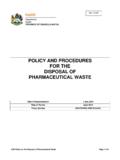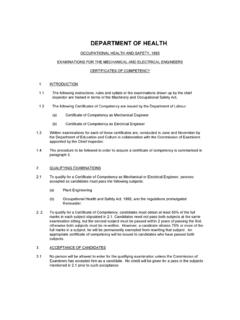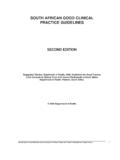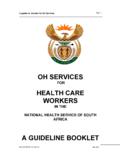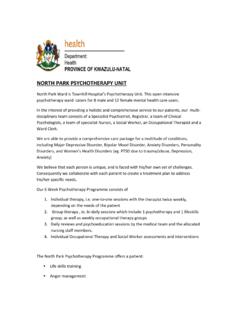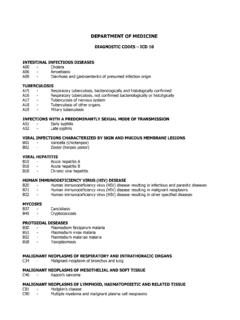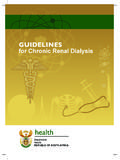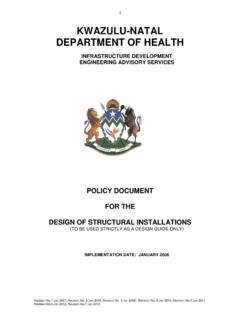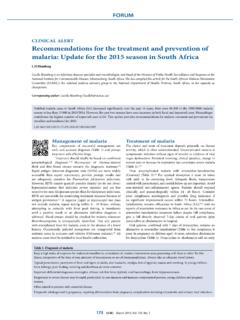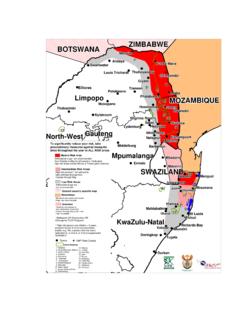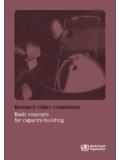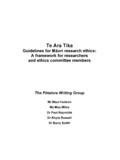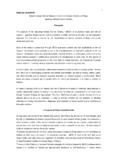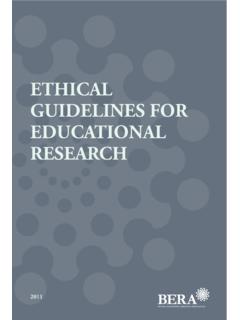Transcription of Book 1: General Principles including research on
1 Contributors to this bookProf SR BenatarProf KD BhoolaProf PE Cleaton-JonesDr WA de KlerkProf D du ToitProf A HermanMs A LabuschagneDr M LeibowitzProf DJ LouwDr N MatsilizaDr AD MBewuDr W OrrProf M PoggenpoelMs C RobertsProf AA van NiekerkProf FFW van OostenProf CW van Editorial CommitteeProf KD BhoolaProf PE Cleaton-JonesDr WA de KlerkProf D du ToitProf A HermanMs A LabuschagneProf DJ LouwDr N MatsilizaDr AD MBewuDr W OrrBook 1: General Principles including research on children, vulnerable groups, international collaboration and to the fourth edition1 What is the South African Medical research Council's ethics policy? General For whom are these Guidelines intended? ethics Conclusion2 What is research ? What constitutes research on humans?3 What is meant by research ethics ? General philosophical concerns and human or anthropological perspectives on ethics in mrdical research4 The medical justification for Patients5 The legal and moral justification for Consent is Form of Requisites of Participant's friend6 Conduct of Responsibility for overall care of Responsibility in the conduct of multicentre and research conducted by non-medical Responsibility for the welfare of research workers and laboratory Adequacy of facilities to carry out Participant privacy and confidentiality7 research research on healthy research on patients8 ethics issues in qualitative Practical ethics issues in qualitative researchProf M PoggenpoelMs C RobertsProf AA van NiekerkProf FFW van OostenProf CW van Wyk.
2 We extend our grateful thanks to the members of the current Editorial Committee and to colleagues who contributed to the third edition, on which the current edition is based. In the order that they appeared in the previous edition they are: Editorial CommitteeProf OW ProzeskyProf SR BenatarProf G DallDr WA de KlerkProf PI FolbProf MP KeetProf J de V LochnerProf DJ LouwProf HJ OdendaalProf AP Rose-InnesProf SA contributorsProf AA van NiekerkDr Paul van HeldenProf J AlexanderDr R I StewartProf PE Cleaton-Jones9 Assessment of the ethics of Independent ethical Knowledge of Clinician-patient Role and competence of the ethics Scientific Function of research ethics of the Method of Suggested format for applications to research ethics Assessing the value and risks of Financial transactions and inducements10 Monitoring the conduct of National ethics Particular role of the research ethics research in Ownership of results of research Legal implications and arrangements for Publication and Liaison with the public media11 International collaborative ethics Principles12 ethics guidelines for 'Public'
3 Versus 'health'13 ReferencesRecommended websites for more information14 AppendicesAppendix I: MRC checklist: quantitative researchAppendix II: MRC checklist: qualitative researchAppendix III: Sample information sheetAppendix IV: Clinical trial compensation guidelinesAppendix V: The Belmont ReportAppendix VI: Declaration of HelsinkiAppendix VII: The Nuremberg CodeBook 1: PrefaceThe Medical research Council of South Africa has a 33-year experience and history of ethics in health sciences research . The entrenchment of the culture of human rights as core value in health research and as one of the four strategic goals of the MRC, has elevated the critical role ethics play in the conduct of research and in society-particularly in a developing country undergoing major changes. ethics is an integral part of every research project but, more critically, ethics is vital for improving the quality of research . The 1st (1977) and 2nd (1987) editions of the MRC guidelines on ethics outlined General philosophical approaches to research ethics based on the Declarations of Helsinki and Nuremburg which, while brief, had to be read.
4 The 3rd (1993) edition differed considerably from the first two by presenting information in a codified form with more detailed, specific recommendations. It was more of a handbook than the first two editions and could be used as a ready reference. Under the Chairmanship of Professor Solomon Benatar and his co-authors, this was an excellent handbook. The 3rd edition was closely based on guidelines of the Royal College of Physicians of London with some flavour for South Africa, but the thrust was essentially that of a developed country - which reflected world-wide trends at the time and also fitted the concepts put forward by WHO and CIOMS. Of the four Principles of ethics (autonomy, beneficence, non-maleficence, justice), non-maleficence was emphasised - a somewhat traditional and paternalistic approach. The guidelines were nevertheless very useful for South African researchers and have been used as the 'gold' standard by South African research ethics committees.
5 A number of important factors necessitated the revision of the MRC ethics guidelines: sociopolitical transformation in South Africa since 1993 plus the South African Constitution with its Bill of Rights; Truth and Reconciliation Commission; and surge of interest world-wide in the field of bioethics, particularly as transgressions of ethics around the world have been exposed. addition to these factors, two major scientific events - the revolution in biology often referred to as the Human Genome Project, and the HIV/AIDS epidemic that is sweeping sub-Saharan Africa - have elevated ethics , raising issues such as the following: Will genetic coding, embryo stem cell research , the cloning of Dolly by Scottish researchers, the current human cloning debates, and germ-line therapy redefine how illnesses are treated? Will the HIV/AIDS epidemic define the African Renaissance in terms of ethics , morality and innovations? Will the current unequal access to anti-retrovirals, the 'virodene' saga, the availability and accessibility of anti-retroviral therapy for mother-to-child transmission of the human immunodeficiency virus and in the public health systems, and the impending availability of HIV vaccine candidate products for clinical trials mainly in developing countries, raise imponderable ethical questions for researchers in society?
6 Addition, in the past few years research ethics guidelines have been reviewed and published elsewhere, for example in Australia and Canada, the latter being a co-operative effort between three research councils. While maintaining established General Principles , each increased their local flavour. There has also been a rise in awareness that developing countries have situations different to developed countries and that individuals and communities in these countries have the right not to be , for the 4th edition the MRC ethics Committee decided that the guidelines must have emphasis on South African needs, and that the dignity of the individual (autonomy) and the importance of informed consent would be strongly emphasised, particularly since informed consent is entrenched in our Constitution's Bill of Rights. The MRC ethics Committee wanted to cut down on duplication of sections within the 3rd edition and other international and SA guidelines, hence the removal of clinical trial guidelines from the MRC book in favour of the International Conference on Harmonisation and South African National Department of Health clinical trial guidelines.
7 There was no reason to 'reinvent the wheel'. The revised guidelines have tried to ensure that the concept of 'the best interest of the research participant' is clear. We have changed the term ' research subject' to ' research participant' to emphasise that research is a partnership; and changed 'doctor' to 'clinician' to make it clear that clinical research is not done only by doctors. These guidelines emphasise that developing communities must not be exploited and that in some way participating communities must benefit from the research done in or with them. The MRC ethics Committee decided on a number of booklets instead of one tome to allow easy updating because research ethics is a 'fluid' field constantly changing. Contributors to each book were chosen for their knowledge and expertise in specific fields. So, while the series editors oversee the production of the books, each book has its own contributors. In this way many colleagues from a variety of disciplines across the country have been involved, which we hope will increase a sense of ownership, multiple perspectives and interpretations.
8 Each book draft was placed on the MRC web site for comment, to widen awareness of the challenges facing health science research and its development are no longer technical but largely social. The future of health science research lies in the three areas of ethics , communication and attending to societal concerns. The need for science to be understood by the public; the need for scientists to communicate better; the need for the public to make choices about what science has to offer in their daily life; the need for the public to participate in and shape the scientific process; and the need for science to integrate the wealth of information that is already existent (convergence theory) have never been greater than today. These are the ideas or questions that are exercising the minds of ethicists, policy planners, health educators, academic researchers and societies that take long-term strategic planning seriously and as part and parcel of innovation and international conclusion: of research in a developing country poses exciting challenges for scholars, practitioners and communities that are driven by the Principles of equity, human rights and the genuine protection of both the powerful and powerless.
9 In developing countries continues to demystify and destroy the male liberal racial theory that emerged in the last century. consent that is based on the language, idiom and culture of the participant is empowering, not only to the subject but also to the investigator. in developing countries remains an important beacon of hope, an integral component and an instrument of transforming society, consolidating young democracies, defining national identities, reclaiming lost cultures and contributing to the global village. allows us to probe and understand the intricate, multifaceted nature of and subtle relationship between power and equality. These guidelines are the first step in trying to provide information and answers to some of these challenges and dilemmas. On behalf of the MRC, I want to thank Professor Peter Cleaton-Jones and his Committee and all those who have taken their time to participate and contribute to the development of these guidelines.
10 Many researchers and participants will use this set of updated guidelines to the benefit of society and the improvement of health research . Dr Malegapuru Makgoba MRC President Book 1: Foreword to the fourth editionIn his foreword to the third edition of these Guidelines, Professor Solly Benatar eloquently wrote of the 'resurgence of interest in the moral aspects of medical practice' including research . In the intervening years, that interest has increased at an exponential rate. Investigators, participants and sponsors have become more aware of rights and increase in ethics information has made the task of the Editorial Committee a difficult one. We decided to keep the basic framework of the third edition, but to split the original single volume into five. Our reasoning is that this will facilitate future updating and reprinting and will enable people with specific interests to find the book that suits them best. We tackled much of the task ourselves, but approached experts in specific fields to produce specialised sections.
